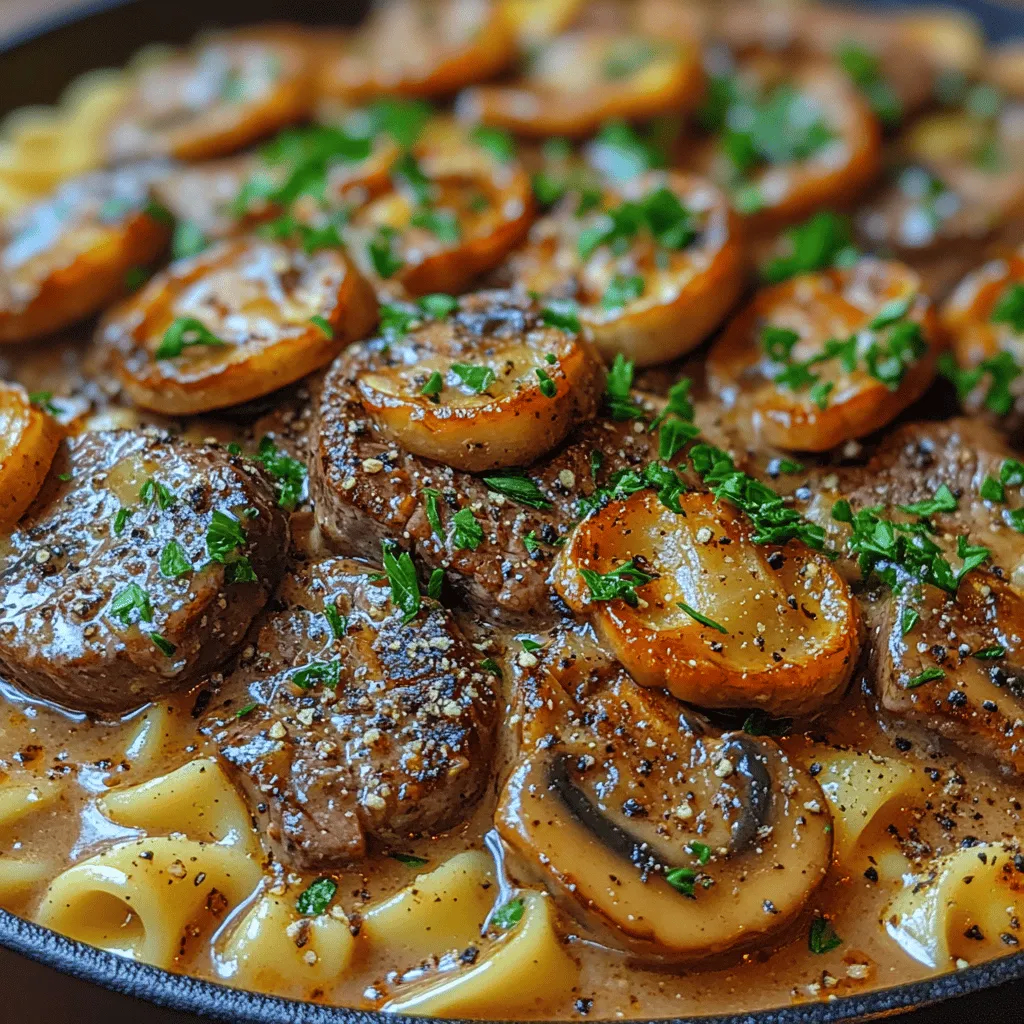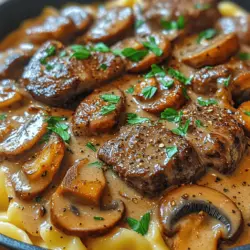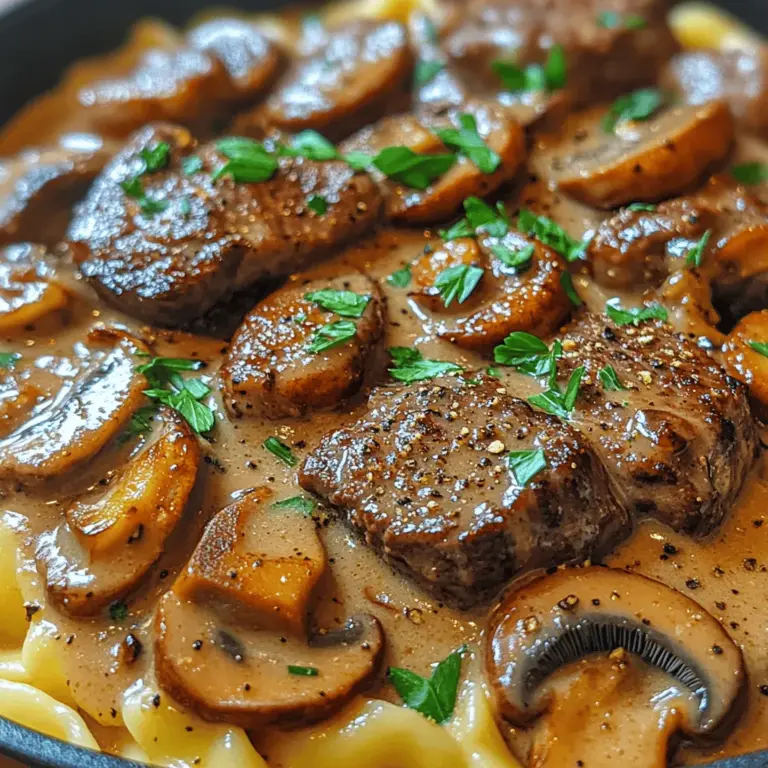Introduction
Beef Stroganoff is a beloved classic, evocative of warm family dinners and cozy gatherings. This dish, known for its rich, creamy sauce and tender beef, has earned its place as a cornerstone of comfort food. The combination of sautéed beef, mushrooms, and onions enveloped in a velvety sauce creates a symphony of flavors that tantalizes the taste buds. Whether it’s a chilly weeknight or a special occasion, Beef Stroganoff serves as the perfect meal to bring loved ones together around the table.
To truly elevate your Beef Stroganoff to melt-in-your-mouth perfection, the importance of high-quality ingredients cannot be overstated. Each component plays a pivotal role in crafting the dish’s signature taste and texture. From the choice of beef to the freshness of vegetables, quality makes all the difference. In this article, you can expect a comprehensive guide that includes detailed steps for preparation, cooking tips for achieving the best results, and insights into the history and variations of this iconic recipe.
Understanding Beef Stroganoff
Historical Background and Origins of Beef Stroganoff
The origins of Beef Stroganoff can be traced back to 19th century Russia, where it was believed to have been created by French chefs working in the service of the Stroganov family, a prominent and affluent merchant family. The dish was likely inspired by French culinary techniques and adapted to local tastes. The original recipe featured sautéed beef in a mustard sauce, served with a side of potatoes.
Over the years, Beef Stroganoff underwent various transformations, particularly as it made its way to different parts of the world. The classic version we recognize today typically includes sour cream and mushrooms, which were later additions that contributed to the dish’s creamy consistency and depth of flavor.
In the United States, Beef Stroganoff gained immense popularity in the mid-20th century, often served over egg noodles or rice. This adaptation showcased the dish’s versatility and made it a staple in many American households. As it evolved, many regional variations emerged, incorporating local ingredients and culinary traditions, yet all maintaining the essence of the beloved original.
Why Beef Stroganoff is a Popular Choice
Beef Stroganoff resonates with many for several reasons. Its comfort food appeal lies in its rich flavors and hearty ingredients, making it an ideal dish for cozying up on a cold evening. The creamy sauce, combined with tender beef and earthy mushrooms, creates a satisfying meal that feels indulgent yet familiar.
Additionally, Beef Stroganoff’s versatility makes it suitable for various occasions. From a quick weeknight dinner to an elegant dish for special gatherings, it can be adapted to suit any setting. The ease of preparation—typically taking less than an hour—also adds to its allure, allowing home cooks to whip up a delicious meal without spending an entire day in the kitchen.
Ingredients Breakdown
Essential Ingredients for Melt-in-Your-Mouth Beef Stroganoff
To create a Beef Stroganoff that lives up to its melt-in-your-mouth reputation, selecting the right ingredients is crucial. Here’s a detailed breakdown of each essential ingredient and its significance in achieving the perfect dish:
– Beef Sirloin: Choosing the right cut of beef is paramount for a tender and flavorful Stroganoff. Beef sirloin is an excellent choice due to its balance of tenderness and flavor. It cooks quickly and remains juicy without becoming tough. For the best results, opt for grass-fed beef, known for its superior taste and texture.
– Fresh Vegetables: Onions and mushrooms are staples in Beef Stroganoff that add depth and complexity to the dish. Sweet onions bring a mild flavor that complements the beef, while mushrooms contribute an earthy richness. Using fresh ingredients not only enhances the flavor but also adds nutritional value to the meal.
– Sour Cream: This ingredient is essential for creating the creamy sauce that defines Beef Stroganoff. Sour cream adds a tangy richness that balances the savory flavors of the beef and mushrooms. For a lighter option, you can use Greek yogurt or low-fat sour cream without sacrificing creaminess.
– Worcestershire Sauce and Dijon Mustard: These two ingredients are key players in adding flavor depth to the dish. Worcestershire sauce introduces a savory umami flavor, while Dijon mustard adds a subtle kick and acidity, elevating the overall taste profile of the sauce.
Suggested Ingredient Substitutions
For those with dietary restrictions or preferences, there are several substitutions that can be made without compromising the integrity of the dish:
– Vegetarian Option: For a meat-free version, consider using mushrooms or tofu as the protein base. Portobello or cremini mushrooms can stand in for beef, providing a hearty texture and flavor.
– Pasta Alternatives: While egg noodles are traditional, you can use gluten-free pasta or whole grain options to cater to different dietary needs. Zucchini noodles or spaghetti squash can also serve as a low-carb alternative.
– Mushroom Varieties: Different types of mushrooms can be utilized to customize the flavor. Consider shiitake, oyster, or even a blend of wild mushrooms for a unique twist on the classic recipe.
Step-by-Step Cooking Process
Preparing the Egg Noodles
The first step in crafting a delicious Beef Stroganoff is to prepare the egg noodles, which will serve as the base for the dish. Cooking the noodles to the perfect al dente texture is crucial, as this will ensure they hold up well when combined with the creamy sauce.
1. Boil Water: Start by bringing a large pot of salted water to a rolling boil. The salt not only flavors the pasta but also helps enhance its overall taste.
2. Add the Noodles: Once the water is boiling, add the egg noodles and stir gently to prevent sticking. Follow the package instructions for cooking time, usually around 7-8 minutes.
3. Check for Doneness: To achieve the ideal al dente texture, taste a noodle a minute or two before the recommended cooking time. The noodles should be firm to the bite without being hard.
4. Drain and Rinse: Once cooked, drain the noodles in a colander and rinse them briefly under cold water to stop the cooking process. This step also helps prevent the noodles from becoming overly sticky.
5. Toss with a Bit of Oil: To keep the noodles from clumping together, toss them with a small amount of olive oil. This will coat the noodles lightly and ensure they remain separate when combined with the Stroganoff sauce later.
With the egg noodles prepared, you are now ready to move on to the next steps of cooking the beef and preparing the sauce, which will culminate in a comforting and satisfying meal that embodies the very essence of Beef Stroganoff. Stay tuned for the detailed instructions on how to bring all these elements together for a truly melt-in-your-mouth experience.

Searing the Beef: Techniques for Perfect Browning
Searing beef is a crucial step in preparing a mouthwatering beef stroganoff. The technique not only enhances the flavor through a rich, caramelized crust but also locks in the juices for a tender bite. Begin by patting the beef dry with paper towels; moisture can hinder browning and lead to steaming rather than searing. This is an essential step to achieve that coveted crust.
To ensure even cooking, slice the beef into uniform pieces, about 1/4 inch thick. The key to perfect browning lies in the temperature of your pan and the amount of meat you add. Use a heavy-bottomed skillet or a cast-iron pan, and heat it over medium-high heat until it’s hot—almost smoking. Add a tablespoon of oil with a high smoke point, such as vegetable or canola oil, to the pan.
Importance of Cooking Meat in Batches
To achieve the best sear, it’s important not to overcrowd the pan. Cooking in batches allows each piece of beef to have enough space to brown properly. When meat is packed too closely together, it releases moisture, which leads to steaming. For beef stroganoff, sear the meat in two or three batches, depending on the size of your pan. Once seared, transfer the beef to a plate and set it aside while you prepare the other ingredients.
How to Avoid Steaming the Beef
Avoiding steaming while searing is all about temperature and timing. Make sure the pan is adequately heated before adding the beef. If the oil begins to smoke, it’s a sign that the pan is hot enough. After adding the meat, resist the temptation to move it around too much; let it sit undisturbed for a few minutes to allow a crust to form. If you find the meat is browning too quickly, reduce the heat slightly to maintain the right cooking temperature without burning.
Sautéing Onions and Mushrooms
Once the beef is seared and resting, it’s time to enhance the flavor of your stroganoff by sautéing onions and mushrooms. Start by adding sliced onions to the same pan, using the residual oil. Stir them frequently, scraping up any flavorful bits left from the beef. This step builds a flavor base for the sauce.
Importance of Caramelization for Flavor
Caramelizing the onions brings out their natural sweetness, which balances the savory elements of the dish. Aim for a golden-brown color—this typically takes about 5-7 minutes over medium heat. Next, add the mushrooms. Their umami profile is essential in elevating the dish.
Tips for Cooking Mushrooms to Enhance Their Umami Profile
For a rich umami flavor, use a mix of mushrooms such as cremini and shiitake. Slice them evenly and add them to the pan after the onions have softened. Sauté until the mushrooms release their moisture and become golden brown, about 5-7 minutes. This process enhances their flavor, and the browning adds depth to the overall dish.
Creating the Sauce
With the beef, onions, and mushrooms ready, it’s time to create the sauce that will envelop them in creamy goodness.
The Role of Flour in Thickening the Sauce
Sprinkle a couple of tablespoons of all-purpose flour over your sautéed vegetables and stir to combine. This step is crucial for thickening the sauce; the flour absorbs the juices and forms a roux, which will help create a thick, velvety sauce. Cook the flour for about a minute to eliminate the raw taste before moving on to the next step.
How to Incorporate Broth and Seasonings Without Lumps
Gradually pour in beef broth while whisking continuously. This method prevents lumps from forming and ensures a smooth sauce. Bring the mixture to a simmer, allowing it to thicken. Add salt, pepper, and a splash of Worcestershire sauce for depth of flavor. Simmer for about 5 minutes.
Combining Ingredients for Optimal Flavor
Now it’s time to bring all the elements together for a cohesive dish.
Techniques for Integrating Sour Cream Smoothly
Once the sauce has thickened, reduce the heat to low and remove the pan from the burner briefly to prevent curdling. Stir in the sour cream gently, allowing it to meld with the sauce without curdling. For a lighter option, Greek yogurt can be used instead, although it may change the flavor slightly.
Adjusting Sauce Consistency with Reserved Pasta Water
If the sauce appears too thick, use reserved pasta water to achieve your desired consistency. Start with a quarter cup and mix it in gradually until you reach the perfect texture. The starchy pasta water will help bind the sauce and enhance its silkiness.
Serving Suggestions
Once your melt-in-your-mouth beef stroganoff is ready, it’s time to think about presentation and pairing.
Presentation Ideas for Beef Stroganoff
Serve beef stroganoff over a bed of egg noodles, rice, or mashed potatoes. For an elegant touch, plate it in shallow bowls, garnished with fresh parsley or chives for a pop of color. This not only enhances visual appeal but also adds a fresh flavor contrast.
Creative Plating Tips to Enhance Visual Appeal
Consider layering the noodles, followed by the beef and sauce, and finishing with a sprinkle of herbs. Using a ring mold can create a neat stack, making the dish look restaurant-worthy. Drizzling a little extra sauce around the plate is also an excellent finishing touch.
Pairing Suggestions (e.g., Side Salads, Bread)
Beef stroganoff pairs well with a variety of sides. A crisp green salad dressed with a light vinaigrette offers a refreshing contrast to the rich sauce. Crusty bread or dinner rolls are perfect for sopping up any leftover sauce, making your meal more satisfying.
Variations for Serving Beef Stroganoff
While traditional beef stroganoff is typically served over egg noodles, there are many ways to enjoy this dish.
Mixing Noodles with the Sauce Versus Serving Them Separately
You can either toss the cooked noodles directly into the sauce for a unified dish or serve the sauce over the noodles. Mixing allows the pasta to absorb the flavors while serving them separately provides a more visually appealing presentation.
Nutritional Information
Understanding the nutritional profile of your beef stroganoff can help you enjoy it more mindfully.
Overview of the Nutritional Profile of the Dish
A typical serving of beef stroganoff, including noodles, provides a balanced meal with protein, carbohydrates, and fats.
Breakdown of Calories, Protein, Fat, and Carbohydrates
On average, one serving contains about 400-500 calories, depending on portion size and the specific ingredients used. This usually breaks down to around 25-30 grams of protein, 15-20 grams of fat, and 40-50 grams of carbohydrates.
Benefits of the Ingredients Used
Beef provides high-quality protein and essential nutrients like iron and B vitamins. The mushrooms add antioxidants, while the sour cream contributes calcium and probiotics, promoting gut health. The onions provide fiber and vitamins, making this dish not just comforting but also nourishing.
Health Aspects of Beef, Vegetables, and Dairy
While beef stroganoff is indulgent, using lean cuts of beef and incorporating plenty of vegetables can make it a healthier option. Additionally, substituting sour cream with a low-fat yogurt can cut down on calories while maintaining creaminess.
Conclusion
Beef stroganoff is a classic dish that embodies comfort food at its finest. With its rich, creamy sauce and tender beef, it’s a meal that brings warmth and satisfaction, perfect for family dinners or special occasions. As you try this recipe at home, you’ll discover how easy it is to recreate this culinary tradition in your kitchen.
The versatility of beef stroganoff allows for personal adaptations, whether you prefer different types of mushrooms, noodles, or even a vegetarian version with plant-based proteins. Embrace the experience of cooking this comforting dish, and enjoy the delightful flavors it brings to your table. Don’t hesitate to get creative with your ingredients and make this dish your own. Happy cooking!

